Software for enterprise resource planning is called SAP. The main business operations of an organization are mapped out by this tool. SAP facilitates increased customer satisfaction. Nevertheless, small businesses cannot afford to use it because maintaining the complete ERP system necessitates specialists, which adds to their expenses.
1. NetSuite
Leading cloud-based ERP solution NetSuite combines e-commerce, CRM, and financials onto a single platform. It provides instantaneous insight into several corporate operations, facilitating well-informed decision-making. Since the system is easily scalable, both small and large firms can use it. Users may easily track important metrics and performance indicators with customisable dashboards. In order to serve international businesses, NetSuite additionally offers multi-currency and multi-language features.
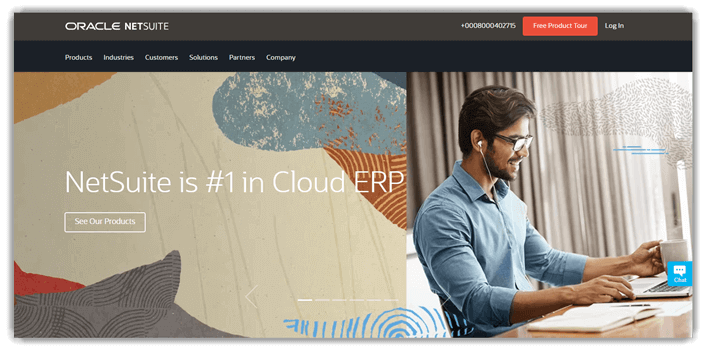
Features:
- Enables you to produce valuable business insights by combining data with visual analytics.
- Reduce cycle durations, involve corporate stakeholders, and improve the planning procedure.
- Helps you to free up the time and resources needed to accelerate growth by streamlining business operations.
- As your business expands, you may add and modify capabilities using this ERP software.
Link: https://www.netsuite.com/portal/products/erp.shtml
2. Microsoft Dynamics
Strong ERP and CRM features are combined into a single package by Microsoft Dynamics, designed for a variety of businesses. Its smooth integration with other Microsoft applications improves teamwork and efficiency all around. With the wide range of customization possibilities available, organizations can tailor the platform to meet their unique requirements. Strong analytics and reporting capabilities help users gain data-driven insights. Microsoft Dynamics is appropriate for many kinds of businesses, from small startups to major conglomerates.
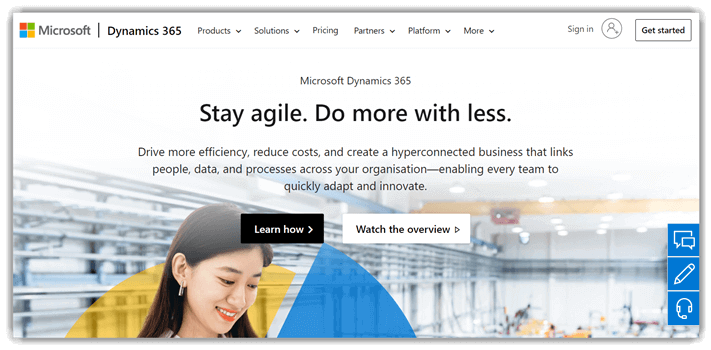
Features:
- Using this ERP software, you may create new apps that are powered by databases.
- For rapid reports, create template Word and Excel files from the data.
- Reduce the amount of data entering to lower the likelihood of errors.
- Use simple-to-configure dashboards and charts to visualize data.
- Aids in creating workflow-based automated data processes.
3. Oracle business
Oracle Business offers a wide variety of applications made to accommodate various business requirements. It is renowned for its sophisticated analytics and gives firms the ability to use data to make strategic decisions. The platform has automation tools that improve operational efficiency and streamline procedures. Oracle guarantees data integrity and security with robust compliance and security procedures. Larger businesses with intricate needs are especially fond of Oracle Business.
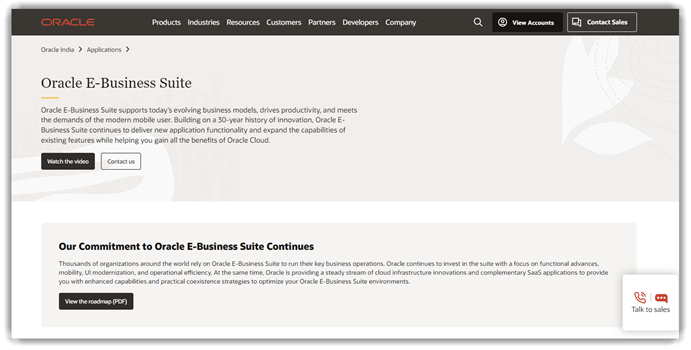
Features:
- Helps you cut expenses associated with time management and maintaining attendance records.
- Organizational policies are simple to implement.
- A simple method for workers to view, submit, and monitor timesheets.
- Enhance decision-making using labor data analysis.
- One of the best ERP systems for keeping up a central skills repository is this one.
- Reduce both excessive and insufficient staffing.
Link: https://www.oracle.com/in/applications/ebusiness/
4. COINCAP
With its focus on project tracking and financial management, COINCAP is a great option for companies on a tight budget. Its user-friendly UI makes navigating easier and improves the overall experience. Teams may stay within budget with the help of COINCAP’s powerful tools for resource allocation and expense control. Additionally, real-time reporting is supported by the platform, giving users rapid insights into financial performance. For businesses who want to keep strict financial control, this ERP solution is perfect.
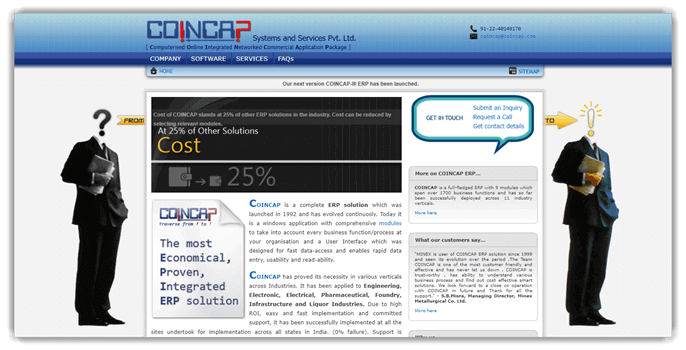
Features:
- Over 1700 business functions—of which 850 are reports—are included.
- Select from among the 1700 business functions to lower ongoing and license costs.
- Online/real-time system. Reports and statistics are all accessible online.
- Scalable to 250 users from 5. historical information for any number of previous fiscal years.
- It can be set up on-site or in the cloud. able to be set up for ten users on a standard desktop. (No requirement for pricey hardware or servers)
- Enhanced dashboard, charting, BI, and MIS capabilities.
- Interface akin to Excel. (Almost no requirement for user training)
Link: https://www.coincap.com/
5. EPROMIS business suite
The EPROMIS Business Suite is an intuitive, integrated ERP solution created especially for small and medium-sized businesses. It integrates project management, HR, and finance—three crucial ERP functions—into a single, unified system. EPROMIS is centered on improving departmental cooperation and optimizing processes and communication. New users are guaranteed a seamless onboarding process because to the user-friendly UI. Businesses on a tight budget might use EPROMIS because of its affordable price strategy.
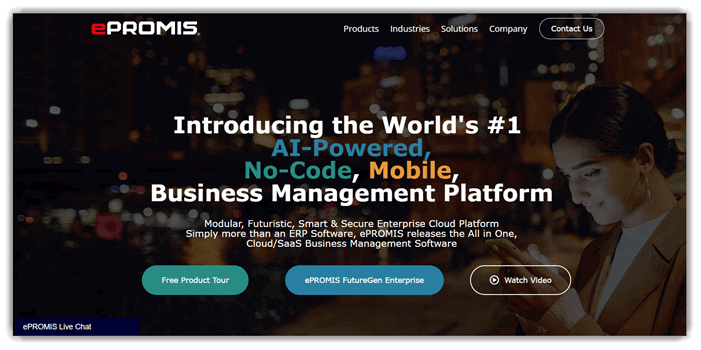
Features:
- Because EPROMIS ERP is compatible with smartphones and tablets, users may access information from anywhere at any time.
- Lets you choose the deployment platform that’s most appropriate for your company.
- You can view your data in real time while on the go with it. facilitates the use of real-time data analytics to help you make the best decisions
- Removes the need for printing and filing, which aids in the creation of an environment.
Link: https://epromis.com/
Conclusion
In conclusion, exploring SAP alternatives reveals a variety of robust ERP solutions that cater to different business needs. Each competitor, from NetSuite’s comprehensive cloud platform to Microsoft Dynamics’ seamless integration, offers unique strengths. Organizations can benefit from Oracle Business’s advanced analytics and COINCAP’s focused financial management features. For small to medium-sized enterprises, EPROMIS provides an accessible yet powerful option. Ultimately, selecting the right ERP system depends on specific business requirements, scalability, and budget considerations.
